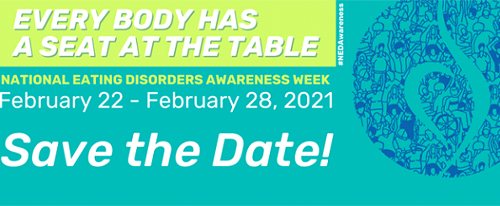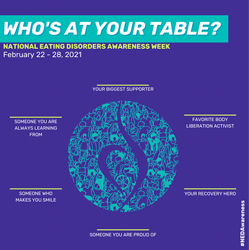
Every year, many organizations and individuals across the nation recognize National Eating Disorders Awareness Week (#NEDAwareness), which is the biggest and most recognized eating disorders education effort in the United States. This year, NEDAwareness Week runs from Monday, February 22 – Sunday, February 28. This national event aims is to shed light on eating disorders through educating, spreading hope, and making resources accessible to individuals in need. The theme for 2021 is “Every Body to Has a Seat at the Table.”
According to the campaign, approximately 30 million people in the United States will be affected by an eating disorder during their lifetime. Even though this year brings additional challenges as we combat COVID-19, communities across the nation are still coming together to raise awareness through social media events, virtual discussions, and more informative and cool activities.
As reported by the National Eating Disorders Association, eating disorders have been found to be most common in teenagers and young adult women, although they can effect people of any gender or age. Eating disorders can negatively impact a person’s physical and mental well-being, and have an effect on personal relationships, confidence, and overall performance at life tasks. In addition, eating disorders can have a significant impact on an individual’s oral health. Your teeth, gums, and the surrounding oral tissues depend on healthy nutrients and a healthy diet.
Eating disorders can stem from many physical, mental and social hardships. If you suffer from an eating disorder, it’s important to talk to your health care providers so that proper diagnosis and treatment can begin.
So, what are some of the different types of eating disorders?
- Anorexia: Individuals with anorexia may experience severe fear of gaining weight and may experience negative thoughts on the way their body appears. Signs may include individuals starving themselves to avoid gaining weight, and excessive exercise.
- Bulimia: This condition is similar to anorexia in the sense that individuals may also have fears of being overweight. However, individuals may also experience periods of overeating/binge eating followed by self-induced vomiting, purging, misusing laxatives, or fasting throughout the day or several times throughout the week.
- Binge Eating or Compulsive Overeating: This condition involves individuals who binge eat but do not regularly try to purge the food. Individuals may experience feelings of guilt, making it easier to continue to overeat.
In fact, your dentist may be the first to notice the signs of an eating disorder as changes in the mouth are often the first physical signs that become noticeable. Unfortunately, eating disorders can cause permanent damage to the teeth and oral tissues. Recognizing the signs of an eating disorder early can help lead to a better and easier road to recovery for the body and mouth.
Some of the oral consequences of eating disorders include:
- Easily bleeding gums
- Swollen salivary glands which may cause Individuals to experience chronic dry mouth, increasing the risk of developing tooth decay.
- Lack of nutrients that promote healthy teeth such as calcium, iron and vitamins B and D can also increase the risk of developing tooth decay and gum disease. Lack of iron can lead to the development of oral sores. Similarly, improper amounts of vitamin B3/niacin can lead to bad breath (halitosis) and the development of oral canker sores. Gums may also become puffy and red.
- Frequent vomiting causes the tooth enamel, or the outer layer of your teeth, to become weak, eroded, soft, and become yellow in color due to the highly acidic environment created from stomach acids. This can create tooth sensitivity when eating hot or cold foods or drinks, and eventually lead to tooth and tissue loss. As enamel wears away, the layer underneath, the dentin, can become exposed and in extreme cases the pulp, which is the next layer of the tooth underneath the dentin, can be exposed and cause infection and pulp death. Tooth decay can even be worsened by extensive tooth brushing following vomiting due to the acidity and weakened state of the mouth.
Water should be rinsed with following purging to help reduce the high acidic content in the mouth. Vomiting can also induce inflammation, cuts, and soreness of the roof of the mouth/soft palate.
- Degenerative arthritis of the jaw’s temporomandibular joints (TMJ) are also associated with eating disorders. This can lead to jaw pain, chronic headaches, and problems chewing and opening/closing the mouth.
If you suffer from an eating disorder, it is important to contact a health professional. To help reduce associated oral health issues it is also important to maintain oral health care by proper tooth brushing and flossing, and frequent visits to your dentist. Your dentist may provide fluoride rinses or other products to help remineralize tooth enamel.

This pandemic has impacted us all, but our community is indeed all stronger together. Our team at WDG always has your safety and health as our top priority, and we have implemented additional safety measures and equipment to help prevent the transmission of all infections, including COVID-19. Wellesley Dental Group has completely reopened since June 8th, 2020 for all dental procedures and cleanings! Thank you for entrusting your health and dental care to us at Wellesley Dental Group.
Feel free to contact Drs. Ali & Ali and the caring team at Wellesley Dental Group if you have any thoughts or concerns; they will be happy to answer your questions! Contact us today at 781-237-9071 or smile@wellesleydentalgroup.com to set up an appointment.
Your little ones and teens are welcome to visit our pediatric dentist, Dr. Derek, and Dr. Emad is happy to help with your TMJ and orthodontic needs. For wisdom teeth extractions or any other oral surgery needs, Dr. Stephens would love to help, and our gum-specialist Dr. Singh can help with your gum-related concerns.
References:
https://www.nationaleatingdisorders.org/get-involved/nedawareness
https://www.nationaleatingdisorders.org/dental-complications-eating-disorders
https://www.mouthhealthy.org/en/az-topics/e/eating-disorders
